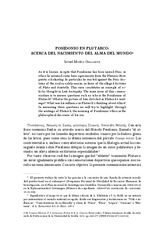Mostrar el registro sencillo del ítem
Posidonio en Plutarco: acerca del nacimiento del alma del mundo
| dc.contributor.author | Muñoz Gallarte, Israel | |
| dc.date.accessioned | 2014-06-09T10:45:58Z | |
| dc.date.available | 2014-06-09T10:45:58Z | |
| dc.date.issued | 2011 | |
| dc.identifier.isbn | 978-84-472-1352-8 | |
| dc.identifier.uri | http://hdl.handle.net/10396/12147 | |
| dc.description.abstract | As it is known, in spite that Posidonius has been named Stoic, in ethics he assumed some basic agreements from the Platonic-Peripatetic scholarship. In particular, he reacted against the Stoic doctrine of the soul as solely reason, in favor of the alleged doctrine of Plato and Aristotle. This view constitutes an example of eclectic thought in Late Antiquity. The main issue of this communication is to answer questions such as: who is the Posidonius of Plutarch? What is the picture of him sketched in Plutarch’s writings? What was his influence in Plutarch’s thinking about ethics? In answering these questions we will try to highlight, through the writings of Plutarch, the meaning of Posidonius’ ethics in the philosophical discourse of his era. | es_ES |
| dc.format.mimetype | application/pdf | es_ES |
| dc.language.iso | spa | es_ES |
| dc.publisher | Universidad de Sevilla, Servicio de Publicaciones | es_ES |
| dc.rights | https://creativecommons.org/licenses/by-nc-nd/4.0/ | es_ES |
| dc.source | En Candau Morón, J.M., González Ponce, F.J., Chavez Reino, González Ponce (Eds.)(2011) Plutarco transmisor. Actas del X Simposio Internacional de la sociedad Española de Plutarquistas (pp. 365-377) Sevilla: Universidad, Servicio de publicaciones | es_ES |
| dc.subject | Plutarco | es_ES |
| dc.subject | Posidonio | es_ES |
| dc.subject | Cosmogonía | es_ES |
| dc.subject | Filosofía griega | es_ES |
| dc.title | Posidonio en Plutarco: acerca del nacimiento del alma del mundo | es_ES |
| dc.type | info:eu-repo/semantics/bookPart | es_ES |
| dc.rights.accessRights | info:eu-repo/semantics/openAccess |

